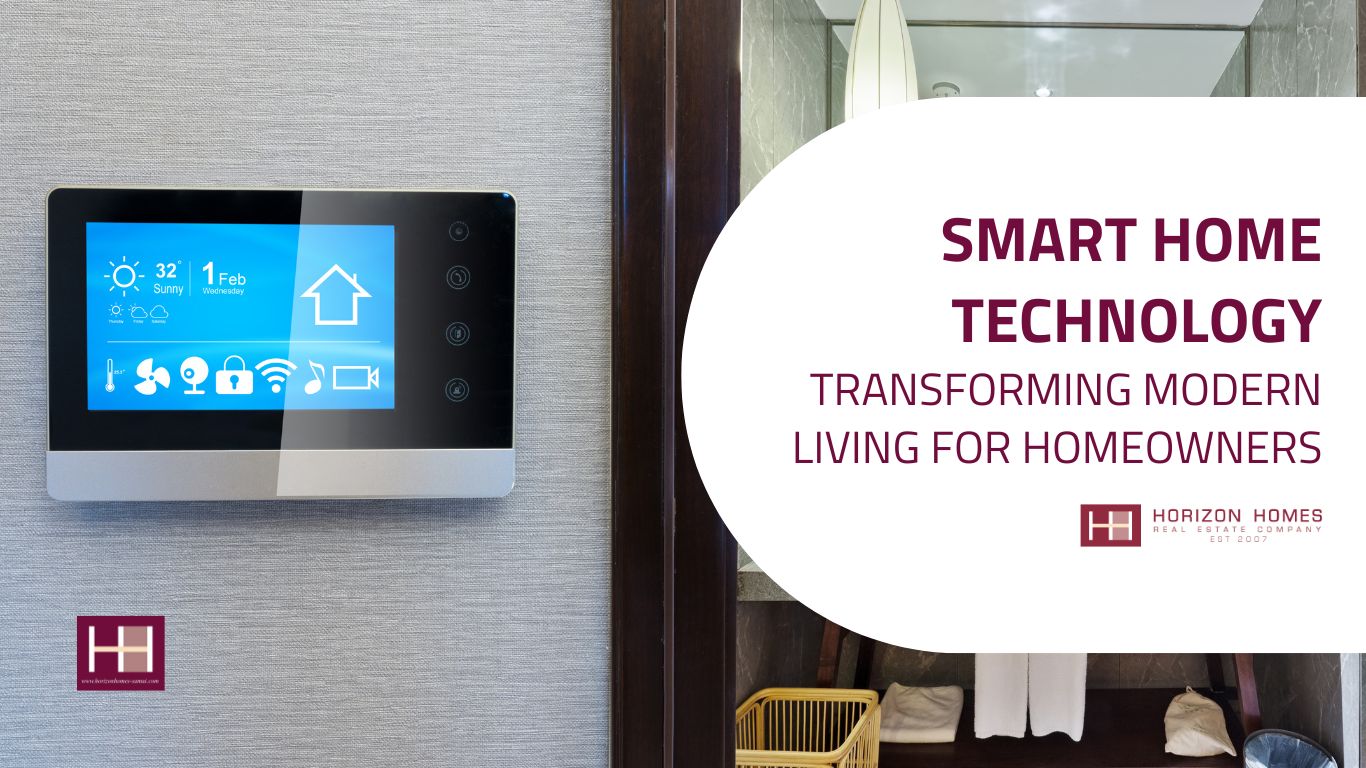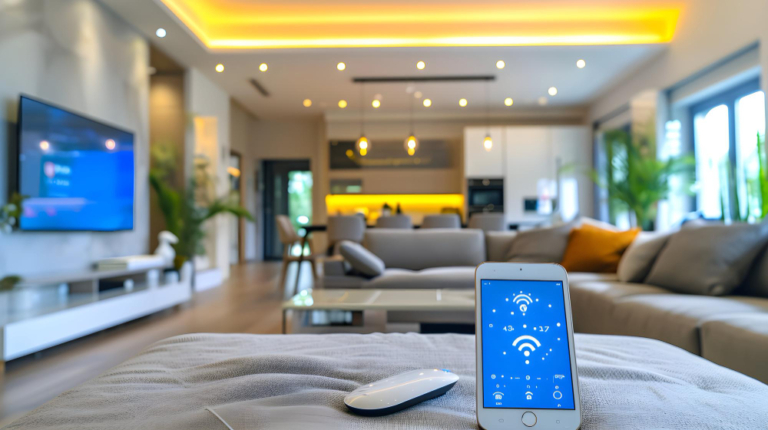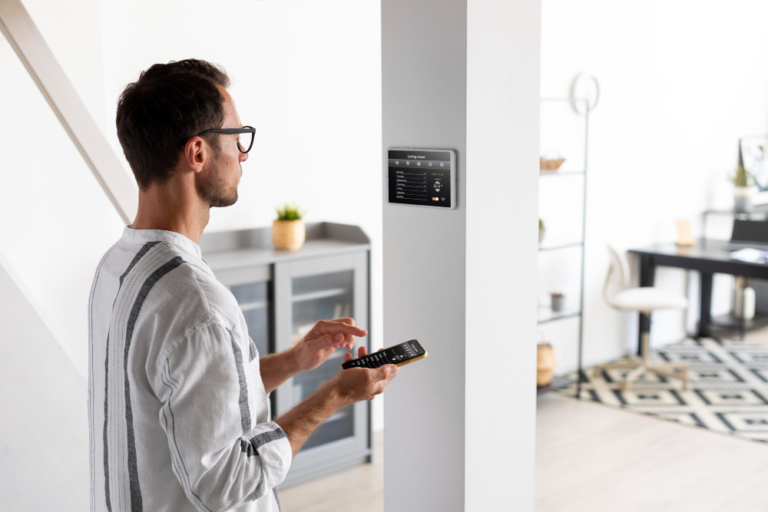Smart home technology is transforming the way homeowners interact with their living spaces, creating a more efficient, secure, and personalized environment. With innovations ranging from home automation smart home solutions to security cameras and voice-controlled devices, smart home smart setups utilize advanced technology to streamline household operations and improve everyday convenience.
In this article, we’ll explore the world of smart home technology, its key benefits, components, and future possibilities, and how it’s revolutionizing the homeowner experience.
What is Smart Home Technology?
Smart home technology encompasses a range of devices and systems that work together to automate and simplify home functions, allowing homeowners to control and monitor various aspects of their smart home home through a centralized network.
The Role of IoT in Smart Home Technology
The Internet of Things (IoT) is the backbone of smart home technology. In an IoT smart home, connected devices communicate with each other and can be controlled remotely via a smartphone, tablet, or other devices. This seamless connectivity enables users to manage their home environment efficiently, from lighting and temperature to security, all through a single platform.
How does smart home technology work?
Smart home technology operates through a network of internet-connected devices that communicate with each other through the Internet of Things (IoT). Everything is coordinated through a central hub, with your smartphone or tablet serving as the master remote control to manage all connected devices.
Key Features:
- Remote control of home devices
- Automated scheduling based on user routines
- AI and machine learning for adaptive functionality
- Real-time monitoring and alerts
While setting up a smart home system requires an initial investment and careful attention to security measures to protect your data, it can lead to significant energy savings over time. The technology needs proper setup and maintenance, but the convenience and potential cost benefits often make it worthwhile for many homeowners.
Advantages and Disadvantages of Smart Homes
| Advantages | Disadvantages |
| Convenience and Control: Remotely control doors, lights, appliances, and more from anywhere, offering peace of mind if you forget something. | Privacy and Security Risks: Data privacy concerns and vulnerability to hacking since devices are connected to the internet. |
| Personalized Experience: Automation based on your habits, like adjusting the thermostat to save energy when you’re not home. | High Initial Cost: Smart home setups can be costly initially, though they may lead to savings over time. |
| Energy Efficiency: Smart devices help reduce unnecessary energy use, leading to lower bills in the long run. | Potential Complexity: May require learning and adjusting to new systems or apps, which could be a hassle for some. |
| Increased Accessibility: Voice and remote controls aid people with disabilities, offering greater independence. | Compatibility Issues: Some devices may not work seamlessly with others, especially if they’re from different brands. |
| Safety and Monitoring: IoT devices allow for non-intrusive monitoring of elderly family members, providing peace of mind. | Constant Updates Needed: Frequent software and firmware updates are often required to keep the system secure and functional. |
Key Components of Smart Home Technology
Home Automation Systems
- Home automation is at the heart of smart home smart systems. It includes functions like lighting, security, climate control, and entertainment that can be managed via automated schedules or triggered by specific events.
- Home automation smart home setups allow lights to turn on automatically at sunset, doors to lock at a specific time, and thermostats to adjust based on occupancy, all contributing to a tailored, efficient living experience.
Smart Home Security Systems
- Modern smart homes come equipped with comprehensive security solutions, including cameras, doorbell cameras, and smart locks.
- These security features provide real-time surveillance, remote access, and two-way communication, allowing homeowners to monitor and protect their property from anywhere, ensuring peace of mind.
Smart Lighting Solutions
- Smart lighting allows homeowners to control the lighting throughout their smart home home, often utilizing energy-efficient LED bulbs.
- Users can adjust brightness, color, and schedules to create the perfect ambiance while reducing energy consumption.
Smart Thermostats and Climate Control
- Smart thermostats learn homeowners’ habits and automatically adjust to provide comfort while conserving energy.
- With remote control capabilities, these thermostats allow homeowners to adjust settings based on weather, room occupancy, and more, providing both convenience and cost savings.
Smart Appliances and Kitchen Automation
- Kitchen appliances, such as smart refrigerators and ovens, are becoming integral to the home automation smart home experience.
- These appliances connect to Wi-Fi, allowing users to monitor their status, receive maintenance alerts, and even automate supply orders, making home management easier and more efficient.
Voice-Controlled Devices and Virtual Assistants
- Voice-controlled assistants like Amazon Alexa, Google Assistant, and Apple Siri enhance smart home technology by offering hands-free control.
- Through simple voice commands, homeowners can control lights, play music, receive information, and even manage tasks, creating an interactive, hands-free environment.
Can a Smart Home Be Hacked?
Smart homes, while convenient, can be vulnerable to hacking through their network-connected devices. However, you can significantly protect your smart home by following key security measures: using strong passwords and changing them regularly, enabling encryption, connecting only trusted devices, keeping software updated automatically, and safeguarding sensitive login information.
While setting up a complete smart home system can cost between $1,000 to $3,500+, individual smart devices are available for under $100, and the potential energy savings can help offset these costs. With these proper security precautions in place, smart homes can offer both safety and convenience for modern living.
The best smart home devices you can buy today
Essential Smart Home Devices:
- Smart Speaker (Echo Dot 5th Gen) – Your affordable hands-free Alexa command center
- Lighting (Philips Hue) – Control mood lighting from your phone
- Security (Ring Doorbell/Arlo Cameras) – Monitor your home remotely with instant alerts
- Door Locks (Nest) – Remote locking and unlocking for peace of mind
- Climate Control (Nest Learning Thermostat) – Auto-adjusts temperature and saves energy
- Cleaning (Roomba) – Automated vacuum for hands-free floor maintenance
Control everything through Alexa or Google Assistant via a smart hub for seamless integration.
How Smart Homes Impact Sustainability
Resource Conservation and Environmental Impact
- Smart home technology contributes to sustainability by conserving energy and minimizing waste. For instance, smart irrigation systems water plants based on weather conditions, while smart thermostats avoid unnecessary heating or cooling.
- These smart devices play a significant role in reducing environmental impact, making smart home technology attractive to eco-conscious homeowners.
Integration with Renewable Energy Sources
- Smart homes are increasingly able to integrate with renewable energy sources like solar panels, providing homeowners with better energy management..This feature allows for an eco-friendly setup where homes can maximize clean energy use, further contributing to a reduced carbon footprint.
The Future of Smart Home Technology
Advancements in Artificial Intelligence (AI)
- AI is expected to drive smart home technology innovation, with devices that adapt based on user behavior and optimize settings for energy efficiency and comfort.
- This predictive technology will allow smart homes to anticipate needs, further enhancing the homeowner experience.
Integration with Smart Cities and Beyond
- As smart home technology advances, the integration with smart cities will create a seamless ecosystem where homes interact with city infrastructure.
- Future smart home home systems may integrate with public utilities, electric vehicles, and traffic management systems, optimizing energy usage on a broader scale.
Conclusion
Smart home technology is revolutionizing modern living, offering homeowners enhanced control, security, and energy efficiency. By connecting devices through IoT smart home setups, smart homes provide a streamlined, user-friendly environment where all aspects of home management are a tap or voice command away. This tech-driven approach not only simplifies daily tasks but also contributes to energy savings and environmental sustainability, making it ideal for the eco-conscious, tech-savvy homeowner.
For those looking to integrate smart home technology, Horizon Homes can guide you in crafting a smart home that aligns with your lifestyle, delivering convenience and future-ready functionality tailored to your needs.







